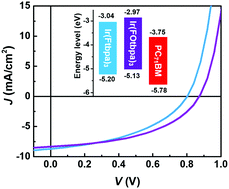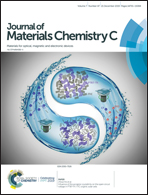Investigation on voltage loss in organic triplet photovoltaic devices based on Ir complexes†
Abstract
Voltage losses in singlet material-based organic photovoltaic devices (OPVs) have been intensively studied, whereas, only a few investigations on triplet material-based OPVs (T-OPVs) are reported. To investigate the voltage loss in T-OPVs, two homoleptic iridium(III) complexes based on extended π-conjugated benzo[g]phthalazine ligands, Ir(Ftbpa)3 and Ir(FOtbpa)3, are synthesized as sole electron donors. T-OPVs are fabricated by mixing two donors with phenyl-C71-butyric acid methyl ester (PC71BM) as an electron acceptor. Insertion of oxygen-bridges as flexible inert δ-spacers in Ir(FOtbpa)3 has slightly elevated both the lowest unoccupied molecular orbital and the highest occupied molecular orbital levels compared to those of Ir(Ftbpa)3, which results in a lower charge transfer (CT) state energy (ECT) for Ir(FOtbpa)3-based devices. However, a higher Voc (0.88 V) is observed for Ir(FOtbpa)3-based devices than those of Ir(Ftbpa)3 (0.80 V). To understand the above result, the morphologies of the two blend films are studied, which excludes the influence of morphology. Furthermore, radiative and non-radiative recombination in two devices is quantitatively investigated, which suggests that a higher Voc can be attributed to reduced radiative and non-radiative recombination loss for the Ir(FOtbpa)3-based devices.



 Please wait while we load your content...
Please wait while we load your content...